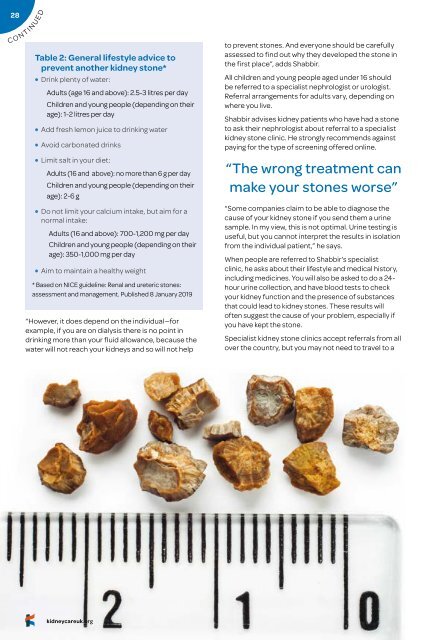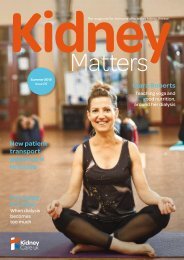Kidney Matters - Issue 7 Autumn 2019
Kidney Matters is our free quarterly magazine for everyone affected by kidney disease. This issue includes a delicious mexico bean nacho recipe from our Kidney Kitchen as well as articles about dialysis away from base, kidney stones, and a feature on looking out for children and young people with kidney disease. We know that being a kidney patient can be tough at times and that accessing the right help at the right time isn’t always easy. We’ve spent a great deal of time over the past year talking to kidney patients on dialysis, asking them what we can do to address this. The response was overwhelmingly ‘improved communication’ on what is going on in the kidney world and what is available to them in terms of support and how to access it. Kidney Matters has been developed to tackle this as well as the many other issues kidney patients face in day-to-day life. Along with shared patient experiences, Kidney Matters provides on how to access emotional and practical support, financial assistance through our grant schemes, advice from leading kidney specialists and tips on how to keep as well as possible by eating a healthy diet whilst on dialysis.
Kidney Matters is our free quarterly magazine for everyone affected by kidney disease.
This issue includes a delicious mexico bean nacho recipe from our Kidney Kitchen as well as articles about dialysis away from base, kidney stones, and a feature on looking out for children and young people with kidney disease.
We know that being a kidney patient can be tough at times and that accessing the right help at the right time isn’t always easy. We’ve spent a great deal of time over the past year talking to kidney patients on dialysis, asking them what we can do to address this. The response was overwhelmingly ‘improved communication’ on what is going on in the kidney world and what is available to them in terms of support and how to access it.
Kidney Matters has been developed to tackle this as well as the many other issues kidney patients face in day-to-day life. Along with shared patient experiences, Kidney Matters provides on how to access emotional and practical support, financial assistance through our grant schemes, advice from leading kidney specialists and tips on how to keep as well as possible by eating a healthy diet whilst on dialysis.
You also want an ePaper? Increase the reach of your titles
YUMPU automatically turns print PDFs into web optimized ePapers that Google loves.
28<br />
C O N T I N U E D<br />
Table 2: General lifestyle advice to<br />
prevent another kidney stone*<br />
• Drink plenty of water:<br />
Adults (age 16 and above): 2.5-3 litres per day<br />
Children and young people (depending on their<br />
age): 1-2 litres per day<br />
• Add fresh lemon juice to drinking water<br />
• Avoid carbonated drinks<br />
• Limit salt in your diet:<br />
Adults (16 and above): no more than 6 g per day<br />
Children and young people (depending on their<br />
age): 2-6 g<br />
• Do not limit your calcium intake, but aim for a<br />
normal intake:<br />
Adults (16 and above): 700-1,200 mg per day<br />
Children and young people (depending on their<br />
age): 350-1,000 mg per day<br />
• Aim to maintain a healthy weight<br />
* Based on NICE guideline: Renal and ureteric stones:<br />
assessment and management. Published 8 January <strong>2019</strong><br />
“However, it does depend on the individual—for<br />
example, if you are on dialysis there is no point in<br />
drinking more than your fluid allowance, because the<br />
water will not reach your kidneys and so will not help<br />
to prevent stones. And everyone should be carefully<br />
assessed to find out why they developed the stone in<br />
the first place”, adds Shabbir.<br />
All children and young people aged under 16 should<br />
be referred to a specialist nephrologist or urologist.<br />
Referral arrangements for adults vary, depending on<br />
where you live.<br />
Shabbir advises kidney patients who have had a stone<br />
to ask their nephrologist about referral to a specialist<br />
kidney stone clinic. He strongly recommends against<br />
paying for the type of screening offered online.<br />
“The wrong treatment can<br />
make your stones worse”<br />
“Some companies claim to be able to diagnose the<br />
cause of your kidney stone if you send them a urine<br />
sample. In my view, this is not optimal. Urine testing is<br />
useful, but you cannot interpret the results in isolation<br />
from the individual patient,” he says.<br />
When people are referred to Shabbir’s specialist<br />
clinic, he asks about their lifestyle and medical history,<br />
including medicines. You will also be asked to do a 24-<br />
hour urine collection, and have blood tests to check<br />
your kidney function and the presence of substances<br />
that could lead to kidney stones. These results will<br />
often suggest the cause of your problem, especially if<br />
you have kept the stone.<br />
Specialist kidney stone clinics accept referrals from all<br />
over the country, but you may not need to travel to a<br />
kidneycareuk.org

















